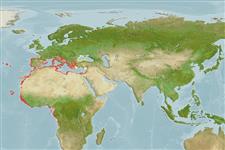Common names from other countries
Environment: milieu / climate zone / depth range / distribution range
Ecología
marino asociado a arrecife; no migratorio; rango de profundidad 2 - 40 m (Ref. 10797). Subtropical; 46°N - 12°S, 32°W - 36°E
Mediterranean Sea: Eastern Atlantic: Along the coast of Portugal to the Gulf of Guinea (St. Thomas Island = São Tomé Island), may also reach Angola. Quoted mainly in the islands (Azores, Salvage, Canary, Annobon, etc.) than on the continent.
Length at first maturity / Tamaño / Peso / Age
Maturity: Lm ?, range 7 - 7.3 cm
Max length : 25.0 cm TL macho / no sexado; (Ref. 10797); common length : 13.0 cm TL macho / no sexado; (Ref. 10797)
Espinas dorsales (total): 14; Radios blandos dorsales (total): 9-11; Espinas anales 2; Radios blandos anales: 9 - 11
Adults form small shoals in midwater above or near rocky reefs or above seagrass meadows (Posidonia. They feed on small planktonic or benthic animals (Ref. 6760). Reproduce in summer (Ref. 6760). Eggs characterized by adhesive filaments are nested on rocky or sandy bottoms (Ref. 6760). Males guard the eggs (Ref. 6760).
Oviparous, distinct pairing during breeding (Ref. 205). Eggs are demersal and adhere to the substrate (Ref. 205). Breed on rocky or sandy bottoms (Ref. 6760). Males guard the eggs (Ref. 6760).
Loris, D. and J. Rucabado, 1990. Pomacentridae. p. 842-850. In J.C. Quéro, J.C. Hureau, C. Karrer, A. Post and L. Saldanha (eds.) Check-list of the fishes of the eastern tropical Atlantic (CLOFETA). JNICT, Lisbon; SEI, Paris; and UNESCO, Paris. Vol. 2. (Ref. 10797)
IUCN Red List Status (Ref. 130435)
CITES (Ref. 128078)
Not Evaluated
Threat to humans
Harmless
Human uses
Pesquerías: escaso valor comercial; pesca deportiva: si
Más información
ReferenciasAcuiculturaPerfil de acuiculturaRazasGenéticaElectrophoresesheritabilidadEnfermedadesProcesamientoMass conversion
Herramientas
Special reports
Download XML
Fuentes de Internet
Estimates based on models
Preferred temperature (Ref.
115969): 16.2 - 27.8, mean 20.1 (based on 208 cells).
Phylogenetic diversity index (Ref.
82804): PD
50 = 0.5000 [Uniqueness, from 0.5 = low to 2.0 = high].
Bayesian length-weight: a=0.01259 (0.00992 - 0.01598), b=2.94 (2.87 - 3.01), in cm Total Length, based on LWR estimates for this species (Ref.
93245).
Nivel trófico (Ref.
69278): 3.8 ±0.4 se; based on diet studies.
Resiliencia (Ref.
120179): Medio, población duplicada en un tiempo mínimo de 1.4-4.4 años (Preliminary K or Fecundity.).
Fishing Vulnerability (Ref.
59153): Moderate vulnerability (35 of 100).
Climate Vulnerability (Ref.
125649): Low to moderate vulnerability (27 of 100).
